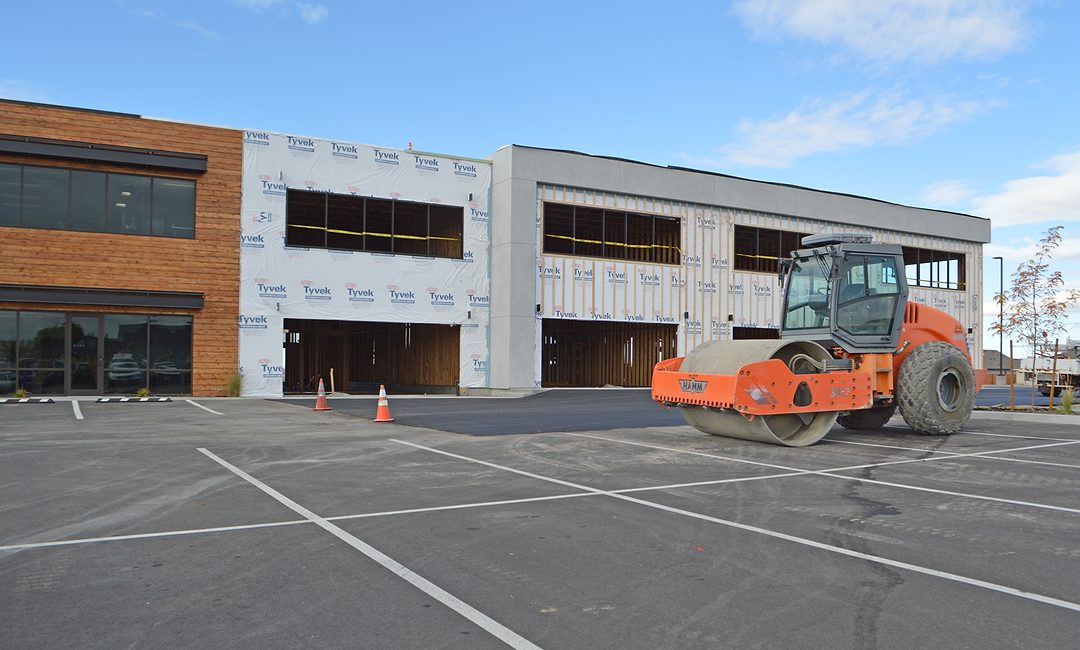
Home » Vocational trade school to open in Pasco
Vocational trade school to open in Pasco

November 15, 2017
A new trade school in west Pasco will provide classroom and laboratory space for apprentices pursuing careers in skilled trades, including future electricians, plumbers and sheet metal workers, all jobs in demand across the state.
The Construction Industry Training Council of Washington, or CITC, is opening its first dedicated schooling site in the Tri-Cities.
The nonprofit currently uses rented space in Pasco.
CITC is considered an “open shop,” as apprentices are not members of a union. The vocational trade school is headquartered in Bellevue and operates schools in Marysville, Vancouver, Tacoma and Spokane.
Prior to this fall, apprentices who enrolled in their final year of the apprenticeship program through CITC would travel to Spokane once a month for two days of classroom and lab work to complete their training.
The new facility on Road 90, off Sandifur Parkway, shares a building with Elite Construction and a Crossfit studio. When completed in the spring, the 9,600-square-foot school will include three classrooms, three laboratories, a conference room, student and reception area and office.
“It’s exciting to be in the Tri-Cities area. There’s a lot of work and there’s a need for a trained work force,” said CITC president Halene Sigmund.
CITC intends to open the facility in time for the spring quarter, which begins March 1. It will be the nonprofit’s smallest location and the newest. The trade school has a goal of offering the fourth level of training in the new Pasco facility by next fall so that it would no longer be a hardship for apprentices to travel out of town to complete their final year.
CITC offers 10 construction apprenticeship programs, including varying degrees of electrical, carpentry, painting, heavy equipment operation, heating, ventilation and air conditioning, sheet metal, plumbing and laborers. Sigmund said 1,100 apprentices are enrolled in programs across the state, with about 100 in the Tri-Cities.
Most apprentices east of the Cascades are enrolled in the program’s three electrical specialties, including commercial, residential and low energy/sound and communication. Plumbing has the second highest number of enrolled apprentices, followed by sheet metal.
These are considered the most popular programs because they are licensed trades in Washington. By receiving a license, workers have a documentable qualification for an employer, which shows they have completed 8,000 hours in on-the-job training, as well as passed the journeyman exam.
A number of occupations in the skilled trades are considered “in demand” in Benton and Franklin counties, according to the Employment Security Department, or ESD.
The department estimates that in 2015 818 people were employed as electricians, 505 as plumbers, pipefitters and steamfitters, and 112 as sheet metal workers.
Each of these trades is expected to have an average annual growth rate expected above 3.5 percent between 2015-20, according to the ESD. This results in an average number of expected yearly openings of 660 across the three trades between 2020-25.
Jared Hunt, 31, is in his third year as part of the electrical apprenticeship program, but just beginning to take classes through CITC this fall.
Prior to that, the former satellite TV installer was enrolled in a program that became decertified. He lost his third year of training and is back in the classroom to complete the necessary requirements toward his goal of “journeying out,” which is considered graduating from the program.
Hunt is sponsored by his employer, Walla Walla Electric. His company pays for his training, and Hunt intends to remain with the company once he finishes classes, but he is under no contractual obligation to do so.
As a self-described “computer geek,” Hunt was attracted to the field because he likes working with his hands and knew he could make good money as an electrician.
One of the perceived benefits of the skilled trades is the guaranteed salary during training, which includes staggered wage increases, usually every six months, or every thousand hours of work. These increases can range from five percent to 15 percent, depending on the trade.
Hunt said he expects to leave the program without student loan debt and move right into a career as a licensed electrician, where he may make $60,000 annually at a starting salary.
“I think everyone should check out the trades because college isn’t for everyone,” he said.
CITC serves as a sponsor for an apprentice’s training, beginning with an apprentice applying to be part of a chosen trade program.
To be accepted to the program, applicants provide documentation of a high school equivalency certificate like a GED, or high school diploma, and complete an online test.
If accepted, the apprentice is added to an eligibility list shared with employers looking to fill a need.
Apprentices then can be hired and earn a paycheck, usually at a starting rate of $12 an hour while also attending classes for 20 hours a month.

Classes are held once a month, on a consecutive Friday and Saturday, which can include homework.
Classroom work is completed on a traditional school calendar schedule, between September and June, but apprentices may begin accumulating trade hours prior to taking classes.
The contractors fund the cost of the training program for the apprentice, and apprentices are usually limited to covering the cost of their books, about $1,000 during the four years of schooling.
CITC offers apprentices the benefits of tracking their class time and their on-the-job training hours, which are reported to the state Department of Labor and Industries.
The 501c3 nonprofit also ensures an employer is clear on its role, which includes training an apprentice within documented apprenticeship standards to provide a full scope of the craft.
Sigmund describes it as “a great partnership between the employer, apprentice and apprenticeship program.”
Employers pay monthly fees for the training, based on labor hours, and there is no subsidizing from the state.
Electrical classes in the Tri-Cities have been taught by a CITC graduate ever since they were first offered about two years ago.
Ken Hill journeyed out of the program in 1993 and has been affiliated with the nonprofit in one way or another ever since. Based out of Spokane, Hill serves as the Eastern Washington regional coordinator, and the only full-time CITC employee east of the Cascades.
“A little over two years ago, we started with 60 or 70 apprentices here. So it’s exploded since then,” Hill said.
Now in his fourth year of teaching, Hill said most apprentices he trains are not heading to jobs with Hanford contractors, as most of those employers tend to include union members.
Instead, Hill said, “I hear a lot of talk of the server farms all over central Washington and central Oregon. It takes a lot of the manpower, and then with all the schools being built in the Tri-Cities, we see a lot of that demand, in addition to the commercial side of the infrastructure.”
Hill said the construction trade is busier now than it was before the recession, which began in 2008. “It’s so valuable to have a skill that you’re certified in,” he said.
The construction industry is typically dominated by men, but Sigmund encourages women to consider skilled trades as a full-time profession. She said the average age for a female enrollee is 38 years old, and 29 years old for a male.
CITC’s president hopes more women will discover these careers earlier so they can find the benefit of stable employment.
“It’s a great thing to see individuals, including women, come into our program, graduate and be successful,” Sigmund said. The council tries to educate the public about the diversity and high demand of the industry, including the wide range of programs, along with the ability to earn a living while learning the trade.
“The shortage of manpower has increased more and more, as roughly five percent of the construction industry retires each year,” Hill said.
Sigmund targets a homegrown work force, with CITC’s mission and purpose “to train a skilled work force in construction for the state of Washington,” since it first launched in 1985.
The licensed vocational trade school hopes to have at least one staff member on site during regular business hours once the facility opens at 5804 Road 90 in Pasco.
To apply for the program, call the corporate office at 877-707-2482 for an application. For more information, visit citcwa.com.
Local News Labor & Employment
KEYWORDS november 2017




